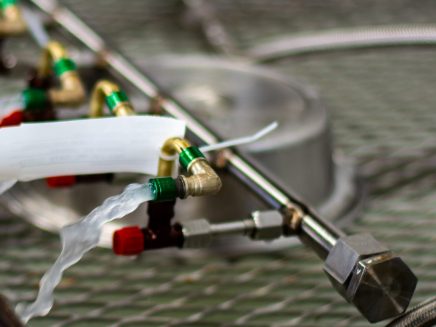Precision cleaning is carried out in a controlled environment where the rooms are immaculately clean, and there is a negligible chance of particle contamination.
Unlike regular cleaning, precision cleaning removes contaminants at the microscopic level. Such a critical level of cleanliness is required in sensitive manufacturing and assembling operations in the aerospace, medical devices, military and defense, semiconductors, food and beverages, and the pharmaceutical industry.
What is Precision Cleaning?
Precision cleaning is a systematic cleaning process, which removes contaminants such as dust, dirt, fibers, grease, oil, and other microscopic impurities to achieve an ultra-critical level of cleanliness.
The cleaning process is composed of two core elements:
- Carefully cleaning the surface using an approved cleaner in a validated manner as per the configuration and composition of the surface material, nature of the contaminant, and the desired level of cleanliness.
- Inspection and testing to ensure that the subject surface of equipment is cleaned according to the required level of precision for quality and safe operation.
Inspection Methods
The verification of a precision cleaned surface can be done using two methods:
- NVR (Non-Volatile Residue Mass Determination) Testing – This involves the measurement of possible residues (mostly oils and greases) that remain on the cleaned surface.
- Ultra-Violet Light Inspection – This is an alternate to NVR Testing, used in circumstances where no fluid touches the surface. However, it can also serve as a supplementary test after NVR.
Considerations before Precision Cleaning
There are certain factors and considerations to take into account before moving on to performing precision cleaning. These factors are:
- How clean do you need your parts?
- Have you got the parts inspected?
- What standards are you following?
- How will you determine standards that suit you best?
Why is it necessary to answer these questions? Because you can only determine your cleaning strategy (or technique) once you have determined your inspection and cleanliness standards.
You need to determine what is appropriate for your industry and then use those standards as the benchmark.
Precision Cleaning Techniques
There is a wide array of possibilities when it comes to choosing your precision cleaning technique. However, based on the considerations mentioned earlier, one of the following methods is used in most industries:
- Aqueous Cleaning: This method involves immersing or spraying the parts with cleaning solution for a period of time. The cleaning solution is made by adding detergent and surfactants to deionized water. This is considered to be an eco-friendly method.
- Solvent Cleaning: This technique uses solvent to remove contaminants from parts with a complex configuration and soil composition.
- Ultrasonic Cleaning: This technique uses high-frequency sound waves to agitate the cleaning solution and remove contaminants from equipment parts. Ultrasonic cleaning typically employs aqueous, semi-aqueous, and solvent-based cleaning systems and detergents.
- High-Pressure Spray Cleaning: This method uses the kinetic energy of a water jet to blast out impurities and soils from the surface. Primarily, the technique also employs certain chemicals to weaken the contaminants first before water blasting.
- Wipe Cleaning: This manual method uses special particle-free wipes or swabs dipped in deionized water or a cleaning solution to hand clean delicate surfaces.
- Flush Cleaning: This method uses turbulent velocity to remove contaminants from piping, tubing, and other parts with internal pathways.
All of these methods have some benefits and drawbacks. For example, the methods using solvents require additional measures for workplace safety.
Unfortunately, these measures sometimes complicate the cleaning process and increase the cost as well.
For these reasons and a few others, many companies use ultrasonic cleaning, which is cost-effective and performance efficient.
Hire Precision Cleaning Experts
PFC has established itself as a thriving commercial and government contractor specializing in precision cleaning following industry standards and strict client specifications.
Precision Companies have been successfully operating on Florida's Space Coast since 1964 and serving clients like NASA, Gas Turbine Efficiency, Mitsubishi, US Air Force, Lockheed Martin, Boeing, Bechtel, Gulfstream, SpaceX, Northrop Grumman, and United Launch Alliance.
We specialize in precision cleaning all tubing and piping systems, including components, fittings, gaskets, and seals. All parts are disassembled, cleaned, and reassembled for complex assemblies in an environment, conforming to ISO 14644 Class 7.
PFC provides precision cleaning services to the following specifications:
| 0-73579 | 1P00070 | 1P00071 |
| 24555-GEN-0001 | 24555-SPEC-0003 | 5-75014 |
| 5-75059 | 5-75192 | ARP1176 |
| ARP1176 | ARP598 | ARP599 |
| AS4059 | AS598 | ASTM D1193 |
| ASTM F312 | ASTM F331 | ASTM G93 |
| CGA 4.1 | IEST-STD-CC1246 | ISO 14644 |
| ISO 14952 | C-SPEC-C-20C | JSKSC-C-123 |
| MA0110-301 | MA0110-301 | MAP211025 VC |
| MIL-PRF-27401 | MIL-SPEC-164D | MIL-STD-1246 |
| MIL-STD-1246 | MSFC-SPEC-164 | NAVY OXYGEN CLEANER NOC |
| PWA 80-81 | RA0110-018 | RA0110-046 |
| RA0110-047 | RA0110-24 | RA1110-022 |
| RA1110-025 | RA1610-065 | RA1610-075 |
| RA321270 | RAPWA80 | RAPWASP80 |
| RPTSTD-8070-0001 | SAE ARP 598 | SAE ARP1176 |
| SN-C-0005 | STP0565 | STP0637 |
| STP1012 | RL10012 | D-0656395 |
| MC072214 | B185020 | STP 50408 |
| MP 50063 | AS 611 | ECSS-E-ST-35-06C |

